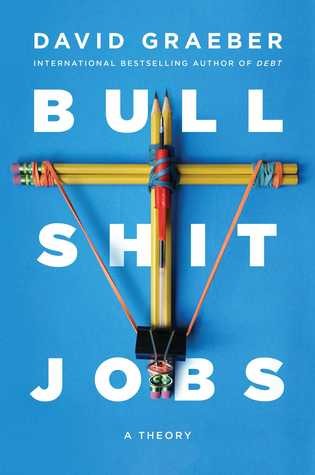fountainhead quoted Bullshit Jobs by David Graeber
That there's a real problem here can be demonstrated by a simple thought experiment proposed in the original 2013 piece: imagine if a certain class of people were to simply vanish. Let me expand on this for a moment. If we all woke up one morning and discovered that not only nurses, garbage collectors, and mechanics, but for that matter, bus drivers, grocery store workers, firefighters, or short-order chefs had been whisked away into another dimension, the results would be equally catastrophic. If elementary school teachers were to vanish, most schoolchildren would likely celebrate for a day or two, but the long-term effects would be if anything even more devastating. And while we can no doubt argue about the relative merits of death metal versus klezmer music, or romance novels versus science fiction, there's no doubt that even if the sudden disappearance of certain categories of authors, artists, or musicians left certain sectors of the population indifferent or even happy, for others the world would become a far more dismal and depressing place. The same cannot be said of hedge fund managers, political consultants, marketing gurus, lobbyists, corporate lawyers, or people whose job it is to apologize for the fact that the carpenter didn't come. As Finn said of his software licensing firm in chapter 4: "If I showed up on Monday and the building had disappeared, not only would society not care, I wouldn't, either." And there are certainly office buildings in the world-I'm sure anyone reading this book can think, just off the top of her head, of several-that, were they to simply vanish, would leave the world much better off. Yet in many of these are precisely the people who get paid the very highest salaries. In fact, it often happens that, at the very top of organizations, apparently crucial positions can go unfilled for long periods of time without there being any noticeable effect-even, on the organization itself. In recent years, Belgium has gone through a series of constitutional crises that have left it temporarily without a sitting government: no prime minister and no one in charge of health, transportation, or education. These crises have been known to continue for considerable periods of time-the record so far is 541 days-without there being any observable negative impact on health, transportation, or education. One has to imagine that if the situation were to endure for decades, it would make some sort of difference; but it's not clear how much of one or whether the positive effects would outweigh the negative ones. Similarly, at time of writing, the Uber corporation, considered one of the world's most dynamic, has seen the resignation not only of its founder, Travis Kalanick, but a host of other top executives,withtheresult that it"is currentlyoperating without a CEO, chief operating offi cer, chief financial officer, or chief marketing officer"-all without any apparent effect on dayto-day operations. Similarly, there's a reason why those who work in the financial sector, and who have extremely well-paid occupations more generally, almost never go on strike. As Rutger Bergman likes to point out, in 1970 there was a six-month bank strike in Ireland; rather than the economy grinding to a halt as the organizers had anticipated, most people simply continued to write checks, which began to circulate as a form of currency, but otherwise carried on much as they had before. Two years before, when garbage collectors had gone on strike for a mere ten days in New York, the city caved in to their demands because it had become uninhabitable.
— Bullshit Jobs by David Graeber (62%)

